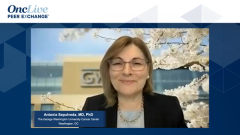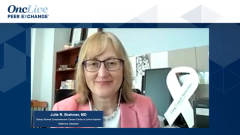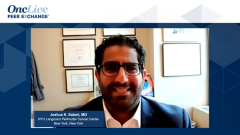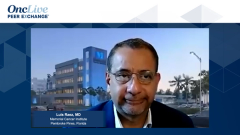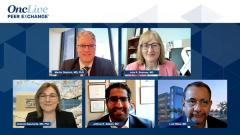
Clinical Pearls and Closing Thoughts on NSCLC Treatment Landscape
Closing out their discussion on biomarker testing and targeted therapies in non–small cell lung cancer, the panel of expert oncologists share clinical pearls and thoughts on the evolving treatment landscape.
Episodes in this series

Transcript:
Martin Dietrich, MD, PhD: Before we come to an end, I would like each of you to share your final closing thoughts. Let’s start with Dr Brahmer.
Julie R. Brahmer, MD: As a medical oncologist, you need to know what tests you are ordering or your institution is using, and make sure that test includes all the targetable mutations or fusions that you need in order to treat the patient the best. And right now, for all non–small cell lung cancer, regardless of smoking status, regardless of histology, they’re supposed to have next-generation sequencing performed. We need to make sure that all of our patients have access to that. Again, making sure you match the target with the therapy, the right therapy for the right patient, from the onset is very important.
Martin Dietrich, MD, PhD: Dr Sepulveda.
Antonia Sepulveda, MD, PhD: On the biomarker front, I would point out that it’s pretty clear that targeted therapies and immunotherapy indeed rely on robust and timely molecular biomarker testing. Next-generation sequencing testing in particular presents challenges about specimen workflows, turnaround time, and accessibility to testing to test result interpretation expertise, especially in the community cancer care setting. One thing we didn’t mention, but I’d like to just put a little sentence here—reimbursement for molecular next-generation sequencing panels is underrepresenting the time spent, the costs carried by laboratories, and the effort and time, and the expertise that molecular pathologists have to put into providing these results.
Another point I’d like to make is that reflexive testing has been shown to be advantageous, in terms of turnaround time, tissue preservation, and enhancing the number of detected mutations and ultimately increasing the number of patients who might benefit from the targeted therapy. Finally, non–small cell lung cancer as well as other cancers are best managed by a multidisciplinary team. Since I’m a pathologist, and I think this is a reality, those teams should include pathologists who are specialized in molecular oncology. I heard some interesting approaches to sort of a network interaction so that we can provide better services.
Martin Dietrich, MD, PhD: Dr Raez.
Luis Raez, MD: Thanks. It was a pleasure to share with you guys. And thanks to OncLive for the invitation. I think really, as Dr Brahmer said, molecular testing is the most important thing. We are not going to provide the right therapy, precision medicine, and everything that we preach if we cannot identify the patients. You’re seeing most of the presentations about testing, yeah, maybe we can get an 80% response rate, but we still have 9 more genes that we have to test, and we’re wearing flying in the 50%, 40%, 30%. It is terrible. I think liquid biopsies help. I think there is a lot of valid concern in the community of doctors that if we order the liquid and the tissue will not get paid, or if the patient is going to be changed, or somebody is going to go to collections. I work in a community area, an academic center, but working in a community area, a safety net hospital, 10% of my patients don’t have any insurance. And I don’t know, the industry has been...I ordered both of [the tests] for 7 years. Nobody has a bill, nobody’s doing collections. There are patient assistant programs, a 1-page fax that you send to the tissue, 1-page fax that you send to the liquid and the tests get done. Let’s take advantage of that because that’s not the same happening any other country in the world. We have disadvantages, and hopefully also the cost of the tests will go down.
Maybe one day we can do the whole genome sequencing or something like that. Or even if we don’t do that, the price of these tests is going to get cheaper. That’s why I don’t want the community people to stop doing molecular testing, because they are worried who is going to get the bill or the patients are going to complain against you. The survival for the patient with ALK [anaplastic lymphoma kinase] and ROS1 as you know is 7 years, a year or something unheard of when we start to lung cancer in the year 2000. That’s why we cannot miss anybody. We cannot miss any other patient, we cannot leave anybody behind. The other thing is, we need to do the clinical trials. That’s why we need to care about the other genetic alterations that don’t have FDA-approved agents. You cannot discourage them and do limited panels because all of us have nice stories of people on clinical trials living longer or getting cured, but we are not going to do that if we don’t identify the other potential genetic markers that can save the lives of our patients. Now remember, we still have the 235,000 lung cancer [patients]. So it’s a lot of people; this is not a weird disease or something rare. That’s why I think it’s very important to keep doing the testing.
Martin Dietrich, MD, PhD: Dr Sabari, we leaned very heavily on you today. So your other final thoughts.
Joshua K. Sabari, MD: I echo everyone’s thoughts. I think if you don’t test, you can’t find it for your patients. It’s not enough just to test, you have to actually look at the report, utilize that data, ask about it. If you’re not sure what it is, ask colleagues, enroll in molecular tumor boards. We all do it on a day-to-day basis in our academic practices. I think we’re starting to see molecular tumor boards infiltrate into the community, and it’s so critical. The other thing is to not just test, but actually wait for the results. A lot of time I see testing done with then reflexing to KEYNOTE-189, carboplatin, pemetrexed, and pembrolizumab. It’s important that you should not start a PD1 inhibitor until you have the results back of your next-generation sequencing tests. Most importantly, as you’ve heard today, there’s a lot of hope, a lot of opportunity and optimism for our patients. Many new therapies coming down the pike. And understanding the correct biomarker in your patient is critical for their survival and their quality of life.
Martin Dietrich, MD, PhD: A wonderful final summary. I wanted to thank everybody on our panel today. Those were expert insights and very helpful for our audience. I do appreciate you tuning in today. Thank you for joining us. We hope you found this OncLive Peer Exchange discussion useful and valuable to your treatment of patients with lung cancer and looking forward to having you the next time. Thank you so much.
Transcript is AI-generated and edited for clarity and readability.


